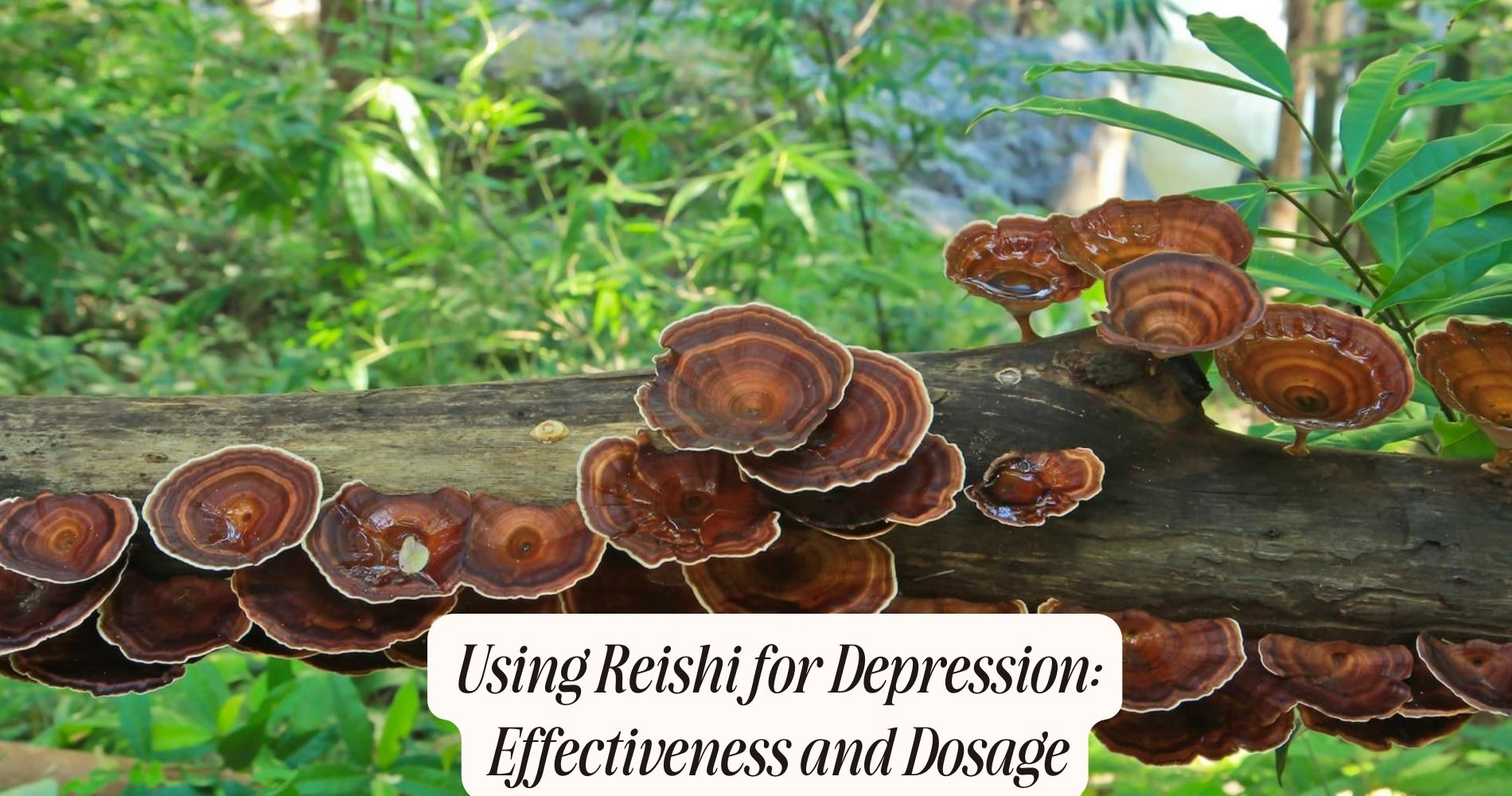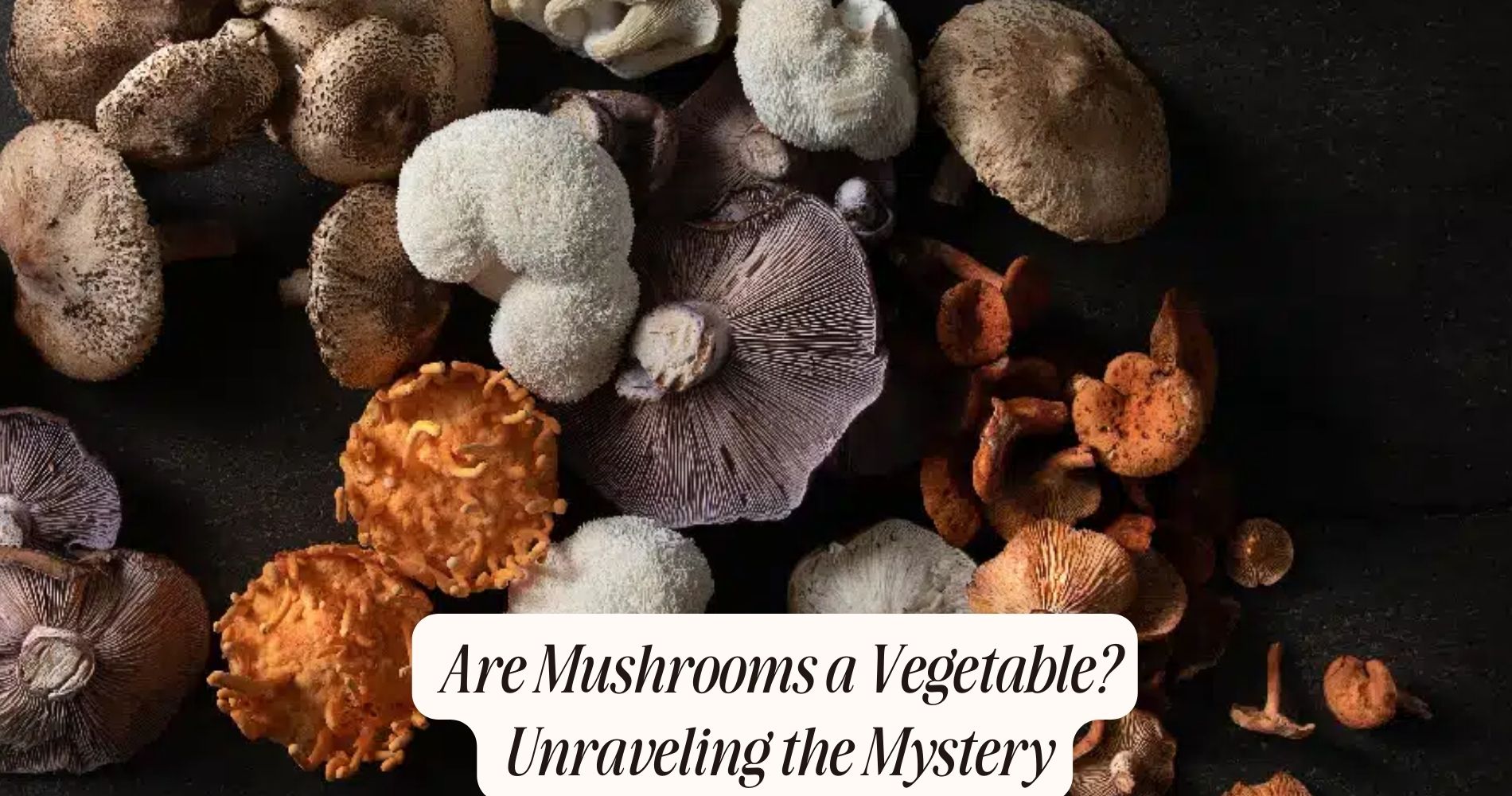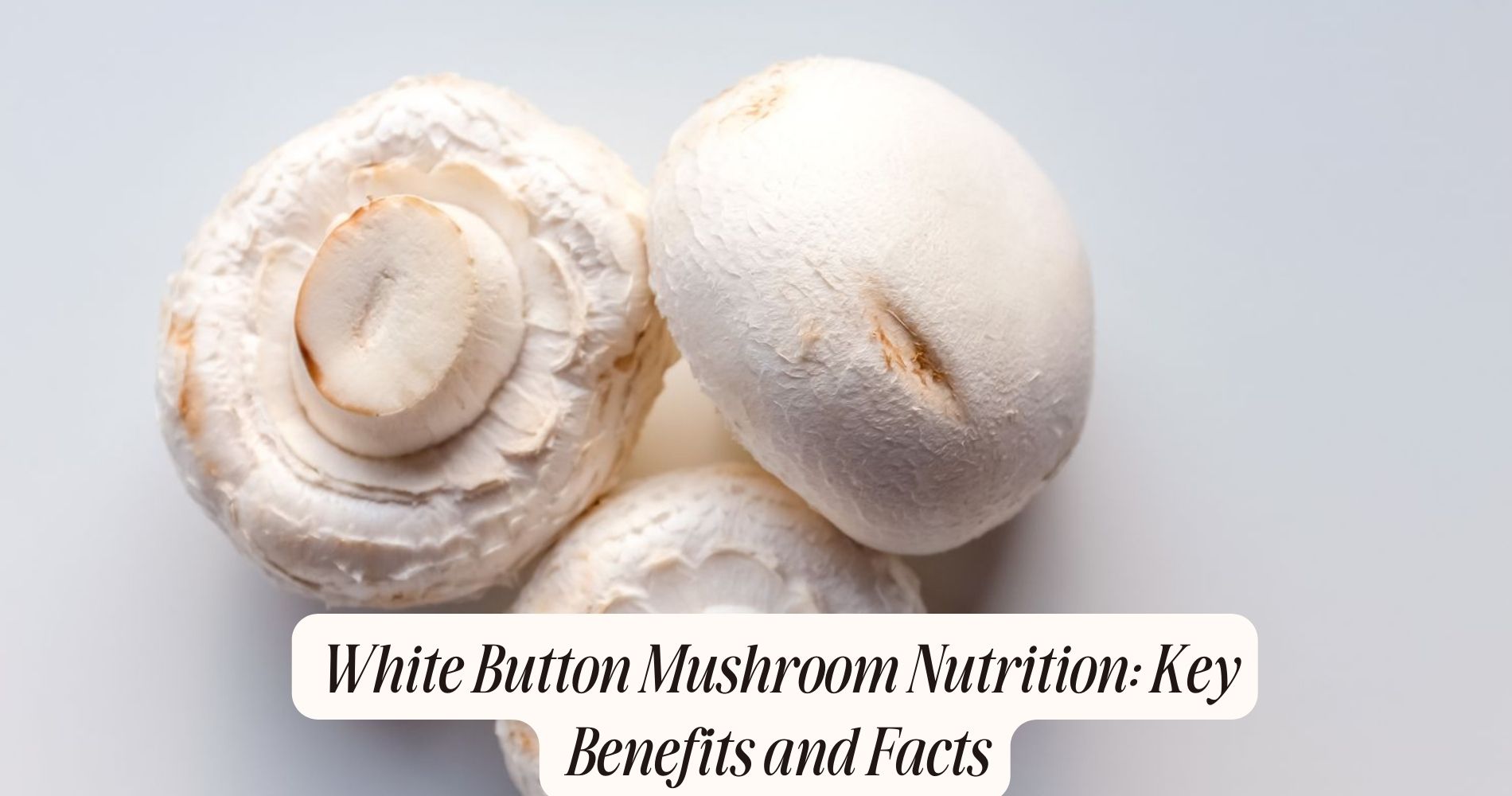
Using Reishi for Depression: Effectiveness and Dosage
Using Reishi for depression can be effective. Studies show Reishi mushrooms help regulate mood by influencing neurotransmitters and reducing brain inflammation. The active compounds, triterpenes, and polysaccharides, are key to these benefits. For best results, take between 1.5 to 5 grams of dried Reishi extract daily. Start with a low dose and monitor for side effects like digestive discomfort or dizziness. Consult your healthcare provider, particularly if combining with other treatments. This approach guarantees safe and effective integration into your depression management plan. There are additional benefits and considerations in using Reishi you might find helpful too.
Understanding Reishi
Reishi, a type of medicinal mushroom, is frequently studied for its potential therapeutic benefits and bioactive compounds. To fully comprehend reishi, you'll need to focus on two vital aspects: reishi cultivation and mushroom identification.
Proper identification is essential because reishi mushrooms (Ganoderma lucidum) share similarities with other non-medicinal fungi. You'll want to look for key features such as its reddish-brown varnished cap and its white to dull brown pores.

Once correctly identified, the next step involves understanding reishi cultivation. Successful cultivation requires a controlled environment, typically involving hardwood logs or sawdust substrates. You'll need to maintain specific humidity and temperature levels to optimize growth. The process can take several months, during which the mushrooms produce various bioactive compounds like triterpenoids and polysaccharides, which are believed to contribute to their medicinal properties.
Accurate identification and meticulous cultivation methods ensure that the reishi mushrooms you use are both safe and potent. By understanding these foundational elements, you're better prepared to explore the therapeutic potential of reishi, which has been traditionally used for its anti-inflammatory, immune-boosting, and antioxidant properties.
Depression and Its Impacts
Understanding the therapeutic properties of reishi sets the stage for exploring how depression affects individuals both mentally and physically. Depression isn't just a fleeting feeling of sadness; it's a complex mental health disorder with far-reaching consequences. Clinically, depression can manifest as persistent sadness, loss of interest in activities, and cognitive impairments. Physically, it can lead to changes in appetite, sleep disturbances, and chronic pain.
The economic impact of depression is staggering. It reduces productivity, increases absenteeism, and drives up healthcare costs. You might find yourself struggling to maintain employment or facing financial instability due to frequent medical appointments and treatments.
Social isolation is another critical aspect. Depression often erodes your ability to engage socially, leading to strained relationships and a diminished support system. The condition can make it challenging to connect with others, exacerbating feelings of loneliness and despair.

Accurately diagnosing depression involves a multifaceted approach, including clinical interviews, standardized questionnaires, and sometimes biological tests. Understanding these impacts is essential for developing effective treatment plans.
Now that you've seen how depression affects every facet of life, you'll better appreciate the potential role of reishi in mitigating these symptoms.
Historical Use of Reishi
Ancient traditions across Asia have long revered the therapeutic properties of reishi, integrating this powerful fungus into medical practices for centuries. In traditional medicine, reishi, known as “Lingzhi” in Chinese, has been utilized for its purported ability to enhance overall well-being. These ancient practices often involved using reishi to balance the body's energy, boost the immune system, and reduce stress, which were foundational concepts in Asian healing systems.
You'll find that historical texts from various Asian cultures consistently highlight reishi's role in promoting mental clarity and emotional stability. For instance, Traditional Chinese Medicine (TCM) practitioners used reishi as a key component in formulas aimed at calming the spirit and alleviating symptoms of anxiety and depression. In Japan, it was common for reishi to be included in Kampo medicine, a system influenced by TCM, for similar purposes.
These ancient practices underscore reishi's long-standing reputation as a potent adaptogen. Adaptogens are substances believed to help the body resist physical, chemical, and biological stressors. By integrating reishi into their treatments, practitioners of traditional medicine aimed to provide a holistic approach to mental health that addressed both physical and emotional well-being.
Scientific Studies on Reishi
Modern scientific research has begun to explore and validate the traditional claims regarding reishi's benefits for mental health, particularly its potential role in managing symptoms of depression.
Classified scientifically as Ganoderma lucidum, reishi is a polypore fungus in the Ganodermataceae family. Researchers have focused on this fungal classification to investigate its bioactive compounds, such as triterpenoids and polysaccharides, which may have neuroprotective and mood-stabilizing effects.
Studies examining reishi cultivation reveal that the growing conditions play a vital role in influencing the potency of these bioactive compounds. For instance, reishi grown on hardwood logs tends to have higher concentrations of beneficial compounds compared to those cultivated on sawdust. This difference is essential for generating reproducible and reliable clinical outcomes.
Several controlled trials and animal studies have demonstrated that reishi extract can modulate neurotransmitter levels, thereby affecting mood and emotional regulation. These studies employ rigorous methodologies, including randomized controlled trials (RCTs) and double-blind designs, to minimize bias and ensure validity.
Reishi's Antidepressant Properties
You should consider Reishi's active compounds, such as triterpenes and polysaccharides, which exhibit potential antidepressant effects.
Evidence from clinical studies suggests these compounds can help regulate mood and reduce depressive symptoms.
Active Compounds Benefits
Reishi mushrooms contain active compounds like triterpenoids and polysaccharides, which have shown potential antidepressant effects through their impact on neuroinflammation and neurotransmitter regulation. These compounds are usually obtained through standardized active compounds extraction methods, guaranteeing consistency in therapeutic applications.
By targeting neuroinflammation, triterpenoids help reduce the inflammatory cytokines often linked to depressive symptoms. Polysaccharides, on the other hand, influence neurotransmitter systems, including serotonin and dopamine, which are vital for mood regulation.
You might also find it interesting that these active compounds offer immune system benefits, which indirectly support mental health. A robust immune system can mitigate the physical and mental toll caused by chronic inflammation. The dual action on both the central nervous system and immune system sets Reishi apart as a potential adjunct in managing depression.

It's important to understand that while these active compounds show promise, their effectiveness can vary based on the extraction methods used. High-quality extraction ensures that you get the maximum therapeutic benefits from the reishi mushroom. This makes it essential to opt for products with standardized extraction processes to guarantee potency and efficacy.
Clinical Study Findings
Several clinical studies have demonstrated that the active compounds in reishi mushrooms exhibit significant antidepressant properties. One such study employed a double-blind, placebo-controlled design to validate the accuracy of its findings. Participants, aged 18-65 and diagnosed with mild to moderate depression, were randomly assigned to receive either reishi extract or a placebo over a period of eight weeks.
In this study, researchers measured outcomes using standardized depression rating scales, such as the Hamilton Depression Rating Scale (HDRS) and the Beck Depression Inventory (BDI). The results showed a statistically significant reduction in depression scores among the reishi group compared to the placebo group. This suggests that reishi's bioactive compounds, including polysaccharides and triterpenes, may play a role in modulating mood and alleviating depressive symptoms.
Another study focused on older adults with symptoms of depression. Here, the study design was an open-label trial, and participant demographics included individuals aged 60 and above. Participants reported improvements in mood and quality of life after consistent reishi supplementation for 12 weeks.
These findings highlight reishi's potential as a complementary treatment for depression, warranting further investigation.
Mechanisms of Action
Understanding the mechanisms of action for Reishi in treating depression involves examining its effects on neuroinflammation and neurotransmitter regulation. Reishi, scientifically known as Ganoderma lucidum, falls under the taxonomy classification of fungi. Its medicinal properties have been extensively documented, particularly its anti-inflammatory and antioxidant capabilities.
When you look at neuroinflammation, Reishi's active compounds, such as triterpenoids and polysaccharides, play an important role. These compounds reduce inflammation in the brain, which is a common contributor to depressive symptoms. By lowering levels of pro-inflammatory cytokines, Reishi may help in mitigating some of the underlying causes of depression.
Regarding neurotransmitter regulation, Reishi influences the balance of key neurotransmitters like serotonin and dopamine. These neurotransmitters are essential for mood regulation. Reishi's compounds appear to enhance the uptake and receptor sensitivity of these neurotransmitters, thereby potentially alleviating depressive symptoms.

Additionally, Reishi has been shown to modulate the hypothalamic-pituitary-adrenal (HPA) axis, which is often dysregulated in individuals with depression. By normalizing HPA axis activity, Reishi can help in reducing stress and improving overall mood.
To conclude, Reishi's effects on neuroinflammation and neurotransmitter regulation present a compelling case for its use in treating depression.
Optimal Dosage Guidelines
Determining the best dosage for Reishi involves evaluating clinical studies and expert recommendations to guarantee both efficacy and safety in treating depressive symptoms. Traditional medicine often utilized Reishi in various forms, such as teas and powders, but modern applications have refined these methods to ensure precise dosing.
Current clinical guidelines suggest that an effective dosage for depression ranges from 1.5 to 5 grams of dried Reishi extract per day. This dosage has been supported by several studies indicating that such quantities are both effective in reducing depressive symptoms and safe for long-term use.
You should start at the lower end of this range, particularly if you're new to Reishi, and gradually increase the dose as needed, closely monitoring your response.
Standardized extracts, often used in modern applications, enable more accurate dosing compared to traditional preparations. For instance, a 10:1 Reishi extract, where one gram of extract equals ten grams of dried mushroom, allows for more straightforward administration.
Always consult healthcare professionals before starting any new supplement regimen, especially if you're concurrently taking other medications. Their expertise ensures the chosen dosage aligns with individual health needs and minimizes potential interactions.
Potential Side Effects
When contemplating Reishi for depression, it's essential to be mindful of potential side effects. You might experience common issues like digestive discomfort and skin rashes, but it's also important to evaluate long-term implications.
Examining individual risk factors will help determine if Reishi is a safe option for you.
Common Side Effects
Being aware of potential side effects such as dry mouth, dizziness, and gastrointestinal discomfort is vital when using Reishi, as it's generally considered safe.
Some users report experiencing digestive issues such as nausea, diarrhea, or an upset stomach. These symptoms are typically mild and transient, but they can be more pronounced in sensitive individuals. Monitoring your response to Reishi can help you gauge whether these digestive issues are manageable or if you need to adjust your dosage.
Allergic reactions, though rare, can occur. Symptoms might include skin rashes, itching, or swelling. If you experience any signs of an allergic reaction, discontinue use immediately and seek medical advice. It's worth mentioning that these side effects aren't common and usually subside once the body adjusts to the supplement.
Additionally, dizziness and dry mouth are other potential side effects. These symptoms can be particularly bothersome if they interfere with daily activities. Staying hydrated and taking Reishi with food might mitigate these effects.
Always consult with a healthcare professional before starting any new supplement regimen to make sure it's appropriate for your specific health needs and conditions.
Long-term Implications
It's important to think about the long-term implications of Reishi supplementation, as prolonged use may pose risks that aren't immediately apparent. While Reishi is often touted for its benefits in mental health and mood stabilization, it's imperative to ponder the potential side effects that could arise with extended use.
Research indicates that chronic consumption may affect liver function, leading to elevated liver enzymes in some individuals. This points to the necessity of regular monitoring, particularly if you have pre-existing liver conditions.
Another area of concern is the impact on the immune system. Reishi is an immunomodulator, meaning it can either stimulate or suppress immune function. Long-term use could potentially lead to immunosuppression, making you more susceptible to infections. Moreover, some studies suggest gastrointestinal issues, such as nausea and diarrhea, may become more pronounced over time.

It's also worth noting that while Reishi can aid in mood stabilization, there's limited long-term data on its efficacy. Prolonged use without medical supervision could result in an imbalance of other critical neurotransmitters, potentially worsening mental health conditions.
Hence, ongoing consultation with a healthcare provider is essential to mitigate these risks.
Risk Factors
Considering the long-term implications, you should be aware of specific risk factors and potential side effects associated with Reishi supplementation. While Reishi is generally considered safe, certain genetic predispositions can increase your susceptibility to adverse effects. For instance, individuals with a history of bleeding disorders may experience increased bleeding risk due to Reishi's anticoagulant properties. Hence, it's important to consult your healthcare provider if you have any genetic predispositions affecting blood clotting.
Lifestyle habits also play a significant role in how your body responds to Reishi. If you consume alcohol regularly or smoke, these habits can exacerbate potential liver toxicity, as Reishi has been shown to affect liver enzymes. Additionally, those with compromised immune systems or autoimmune diseases should exercise caution, given Reishi's immunomodulating effects.
Common side effects include dry mouth, dizziness, and stomach upset. More severe reactions, although rare, can involve liver damage and allergic responses. It's important to start with a lower dosage to gauge your body's reaction, especially if you have existing health conditions or a complex medical history.
Always prioritize discussing any new supplement with your healthcare provider to mitigate these risks effectively.
Combining Reishi With Other Treatments
Combining Reishi with standard treatments for depression, such as SSRIs or cognitive-behavioral therapy, may enhance therapeutic outcomes by leveraging its potential mood-stabilizing properties. This concept, known as therapeutic synergy, suggests that integrating Reishi with existing treatments could offer a more comprehensive approach to managing depression.
Reishi's adaptogenic and anti-inflammatory effects might complement the pharmacological action of SSRIs, potentially leading to improved mood regulation and emotional stability.
When adopting holistic approaches, it's crucial to consider the individual patient's unique needs and medical history. While SSRIs target neurotransmitter imbalances, Reishi may support overall well-being by modulating stress responses and immune function. This dual strategy can be particularly beneficial for patients who don't fully respond to conventional treatments alone.
Moreover, Reishi's low risk of severe side effects makes it an appealing adjunct therapy. However, you should always consult with a healthcare provider before incorporating Reishi into your treatment plan. Clinical evidence is still emerging, so professional guidance ensures safe and effective use.
Practical Tips for Use
When incorporating Reishi into your depression management plan, consider starting with a low dosage and gradually increasing it to monitor its effects and guarantee safety. Begin with 1 gram per day, and if well-tolerated, you can increase to 2-3 grams daily. Always consult your healthcare provider before making any adjustments.
To make sure you're purchasing high-quality Reishi, look for reputable suppliers who provide third-party testing results. These tests verify the product's purity and potency. Avoid products with fillers or artificial additives, as these can diminish Reishi's effectiveness. Capsules and powders are common forms; choose one that fits seamlessly into your daily routine.
Proper storage methods are essential for maintaining the efficacy of Reishi. Store it in a cool, dark place away from moisture and direct sunlight. An airtight container will help preserve its active compounds. If you're using a powdered form, consider refrigerating it to extend its shelf life.
Enhance Your Mood with SUPER MUSHROOM GUMMIES
As you consider the benefits of using Reishi for depression, SUPER MUSHROOM GUMMIES by Well Gummies offer a convenient and tasty way to incorporate Reishi and nine other functional mushrooms into your daily regimen. These vegan gummies are crafted to support a balanced body and a clear mind, providing calmer energy and sharper focus. Infused with the natural flavor of fresh wild berries, they taste as delightful as your favorite candy, without any jitters or crashes. Incorporate SUPER MUSHROOM GUMMIES into your wellness routine to harness the mood-regulating benefits of Reishi and other powerful mushrooms every day.
Frequently Asked Questions
Can Reishi Be Used in Conjunction With Prescription Antidepressants?
Yes, you can use reishi with prescription antidepressants, but you must be mindful of potential interactions. Consult your healthcare provider to address safety concerns and confirm there's no risk of adverse effects.
How Long Does It Take to See Results From Reishi?
You might start seeing results from reishi within a few weeks, though personal experiences vary. Clinical trials suggest benefits may take longer to manifest. Always monitor progress closely and consult with your healthcare provider.
Is Reishi Suitable for Children With Depression?
You should consult a pediatrician before giving reishi to children with depression. Children's dosage and safety concerns need careful evaluation, as there's limited evidence on its effectiveness and potential side effects in young patients.
Are There Any Dietary Restrictions While Taking Reishi?
You don't need strict dietary restrictions while taking Reishi, but be mindful of potential nutrient interactions. Confirm food compatibility by avoiding excessive alcohol or caffeine, which may interfere with Reishi's potential therapeutic benefits.
Can Reishi Be Used During Pregnancy or Breastfeeding?
You should consult your healthcare provider before using Reishi during pregnancy or breastfeeding. Safety concerns and potential interactions with other medications or conditions make it essential to get professional guidance tailored to your specific situation.
Conclusion
You've explored how reishi could potentially alleviate depression based on scientific studies and historical use. By understanding its antidepressant properties and best dosage guidelines, you can make informed decisions about incorporating it into your treatment plan.
Be mindful of potential side effects and consider combining reishi with other treatments for a holistic approach. Always consult with a healthcare professional to make sure it's the right fit for your needs and to avoid any adverse interactions.




